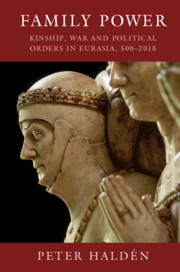Book contents
- Family Power
- Family Power
- Copyright page
- Contents
- Preface and Acknowledgements
- Chronology
- 1 Introduction
- 2 How Social Science Separated Families from Political Order
- 3 Formless Kinship in Formless Polities
- 4 Consolidating Dynasties and Realms
- 5 Strong Aristocracies in Strong States
- 6 The Revival and Sudden Death of Political Kinship
- 7 The Arab Empires c.632–c.900
- 8 Sacred Yet Supple
- 9 The Ubiquitous and Opaque Elites of the Ottoman Empire c.1300–c.1830
- 10 Clans and Dynasties in the Modern Middle East
- 11 Conclusions
- Bibliography
- Index
7 - The Arab Empires c.632–c.900
Published online by Cambridge University Press: 09 March 2020
- Family Power
- Family Power
- Copyright page
- Contents
- Preface and Acknowledgements
- Chronology
- 1 Introduction
- 2 How Social Science Separated Families from Political Order
- 3 Formless Kinship in Formless Polities
- 4 Consolidating Dynasties and Realms
- 5 Strong Aristocracies in Strong States
- 6 The Revival and Sudden Death of Political Kinship
- 7 The Arab Empires c.632–c.900
- 8 Sacred Yet Supple
- 9 The Ubiquitous and Opaque Elites of the Ottoman Empire c.1300–c.1830
- 10 Clans and Dynasties in the Modern Middle East
- 11 Conclusions
- Bibliography
- Index
Summary
The empires of the first centuries of Islam depended on kinship as a principle of legitimacy. Descent from the extended family of the Prophet Muhammad was necessary in order to become Caliph, the political and spiritual leader of the faithful. Consequently, both the Umayyad and the Abbasid dynasties legitimated their rule by reference to blood relations to the Prophet's family. There were also numerous aristocratic families similar to the European nobility but with the important difference that the former were never formalized. Nevertheless, the Arab empires had an ambivalent attitude to hereditary power. Imperial rulers often tried to break the power of the hereditary elites instead of embedding them in a stable system. The result was that few elites trusted the political system and opted for ‘exit’ rather than ‘loyalty’ in times of crisis and war. This also destroyed the Arab empires as rulers had to import foreign mercenaries.
- Type
- Chapter
- Information
- Family PowerKinship, War and Political Orders in Eurasia, 500–2018, pp. 204 - 232Publisher: Cambridge University PressPrint publication year: 2020

